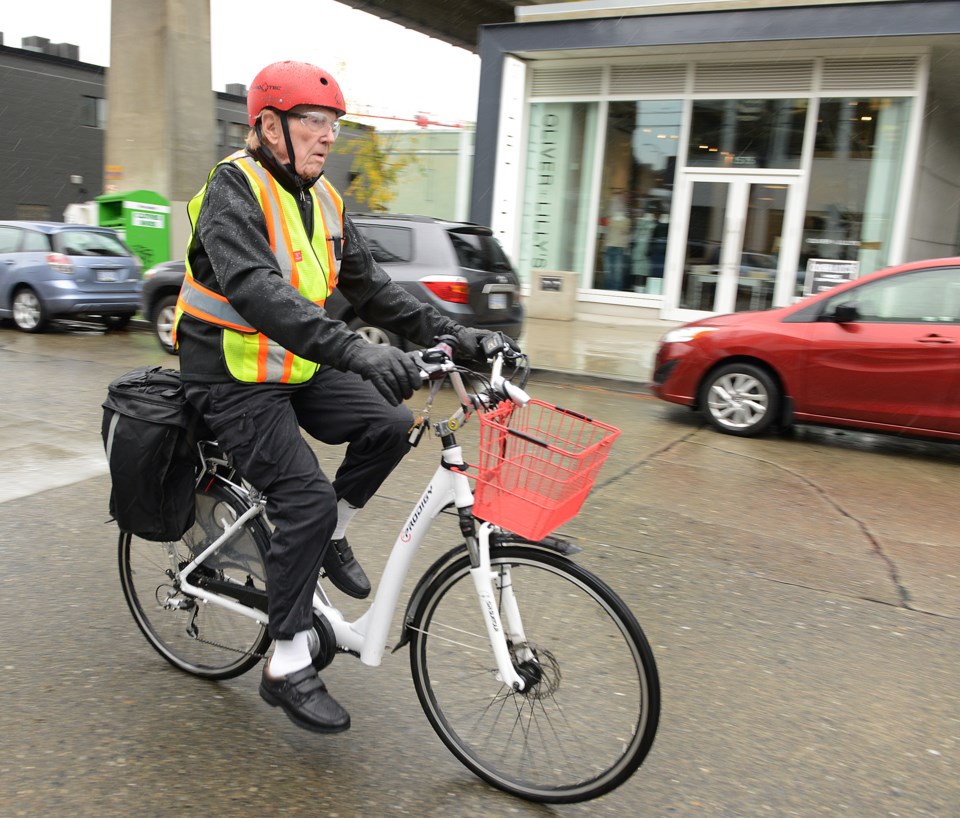Considering Vancouver and Victoria are the only major urban centres in Canada that enjoy almost year-round cycling weather, it’s no wonder the electric bike is becoming an increasingly important component of urban commuting.
The eBike has also turned out to be a blessing for this senior by offering freedom from my mobility issues. I’ve discovered there are two distinct types of eBikes, one that resembles an ordinary bike in which the electric mechanism assists the rider, and the type resembling a motor scooter, which seems impractical to pedal.
Ease of pedalling led me to the first feature to seek in selecting an eBike: How easy is the bike to pedal when the battery is flat or there’s a malfunction of the propulsion system? Some kind of failure could occur over the life span of the machine, so it is nice to know that you can carry on to your destination if a problem occurs. So your first test ride should be without power.
The second most important consideration is where can you get your eBike serviced? Most bike shops can fix punctures and adjust brakes, but few have a technician on staff that can service or repair the power train.
I am currently on my third eBike in two years. The first was a Cyclamatic, which I imported from the U.S at a cost of about $1,200. After roughly six month’s operation, a fault occurred with the motor and I couldn’t find anyone in the city who could solve the problem. The supplier in the U.S. was very supportive, however, it took them a long time to obtain a new motor, complete with rear wheel, from the manufacturer in China. Eventually the bike was as good as new but in the meantime, I had given up hope of ever getting it fixed so I started looking for a replacement.
One of my criteria is that a bike must be capable of delivering some exercise. The iGo Bike, sold in Vancouver for about $1,900, met this requirement so I settled on that model — a choice that turned out to be a disaster. The chain came off twice on my first two rides and on my third trip it broke and fell off in the road. The eight-speed derailleur gears were continual trouble and some cogwheels and the chain wore out very quickly and had to be replaced.
The battery was guaranteed for approximately 750 charges, but only lasted for about 300. A battery costs $595 plus tax. In the meantime the dealer skipped town and moved too far away for me to get to his premises for servicing. In the end, I became so frustrated trying to make the machine reliable and dealing with a disinterested retailer and a supplier in Montreal, I wrote the thing off.
This leads me to the second most important consideration when shopping for an eBike — make sure the retailer has a knowledgeable technician on staff. You’re unlikely to find such a person in an ordinary bike shop. Look for an outlet that deals mainly or exclusively in eBikes and has a reasonable service department.
My third eBike, an eProdigy, is the best one I’ve owned so far. It cost about $2,800 at Reckless Bike Shop on Howe St. They have shops centrally located to the main east-west and north-south cycle corridors in the city and have competent technicians on duty seven days a week. Their service, interest and products have gone a long way to re-inspire my waning interest in these machines.
I am a “senior” senior citizen and to give mine a decent try out I recently rode 40 kilometres from downtown Vancouver to North Delta, negotiating several steep and long hills enroute, including the Alex Fraser Bridge. It was absolutely no trouble at all, an overall fun trip and, for me, an adventure. So far I have 400 kilometres on the odometer.
The economics go something like this: A bike should last at least four years and cost about $2,500. One new battery during that period costs about $500 for a total outlay of $3,000, which spread out over a commute five times per week for four years, works out to less than $3 per day. I commute to Vancouver General Hospital seven times a week and I’m there for four hours each day. Parking normally costs $3.50 per hour so the savings are significant. There are no parking costs, no transit fares, no gas or insurance fees, no cumulative car mileage or wear and tear. What’s more is you feel good, you’re getting a bit of exercise and you’re leaving a space for those who must drive or use transit.
I ride my bike in most weather but when it’s pouring or the roads are icy I take the car.
Eric Mold is an 85-year-old veteran who finds walking painful due to artificial hips and knees. Mold has once again found freedom through the use of an eBike.



